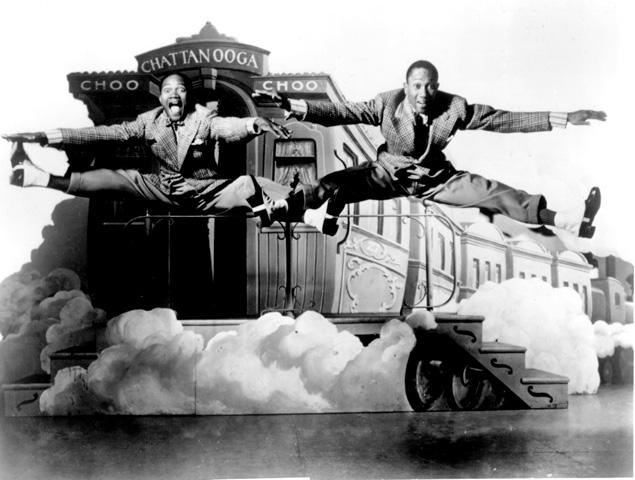The Nicholas Brothers in 1941. They are among the African-Americans whose work and lives were chronicled by cultural historian Delilah Jackson.
Delilah Jackson spent her life doing something wonderful: holding open the door to the past.
Jackson, a Harlem native and confirmed New Yorker who died last month at the age of 85, was a “cultural historian,” which in her case primarily meant researching, chronicling and preserving the black entertainment legacy from the late 19th century through the mid-20th century.
The richness and influence of that culture can’t be overstated. The problem is that way too often, it isn’t stated at all.
If you know Bill (Bojangles) Robinson, Ella Fitzgerald, Cab Calloway and Lena Horne, you know the visible part of the iceberg.
If you know Bert Williams, Flournoy Miller, Josephine Baker, Eubie Blake, Moms Mabley, Honi Coles, Florence Mills, the Nicholas Brothers and the Apollo chorus line, you’re a little deeper in the water.

Entertainer Porter Ellis and Delilah Jackson appeared in the 1984 movie ‘The Cotton Club.’
But you also should know John Bubbles, Chinky Grimes, the Harris Twins, Tondelayo, Bunny Briggs, Morgan and Marvin Smith, Vivian Brown, Groundhog, Hyacinth Curtis, Norma Miller, Henry LeTang, Harold Cromer, Baby Sanchez, Eddie Parton, Frankie Manning, Gordon Anderson, Teddy Hale, Leonard Reed, Fredi Washington, the Berry Brothers, Savannah Churchill, Willie Bryant, Cholly Atkins, the Copacetics and a few hundred others.
You should know Clarence Robinson. He choreographed the 1943 film “Stormy Weather,” and 70 years later, the finale with Harold and Fayard Nicholas dancing to Calloway’s “Jumpin’ Jive” still takes your breath away.
You should know them not because there will be a quiz, but because they were exceptional at what they did, which was singing, dancing, taking pictures, telling jokes and generally delivering the kind of satisfying entertainment that makes our ride through this mean old world a little smoother.
That’s more than important. It’s necessary.
Their memory and their work need to be preserved so people today and tomorrow can know about it. That’s where Delilah Jackson came in.

John Bubbles with the Cab Calloway Orchestra
She spent decades collecting scattered and often random source material, from black newspapers and obscure books to promo cards to a 1934 Cotton Club program and menu. (If you’re ready to order, filet mignon with French fries was $3. Lobster Newburg was $2.50. A shot of Johnny Walker Red was 85 cents.)
She shone a spotlight on this culture. Thankfully, she wasn’t the only one who did it, or is doing it, but few have been more ferocious in the pursuit.
She tracked down everyone she could find, mining their memories, looking at what they had saved, taping interviews to preserve what would otherwise have disappeared.
Around New York you only had to say “Delilah” to artists of the era and they knew who you meant. She became friends with many of the performers she interviewed. If they moved to nursing homes, she would visit and read. She developed a particular fondness for chorus line dancers, who she felt were overshadowed by the male dancers and never got their proper respect.

